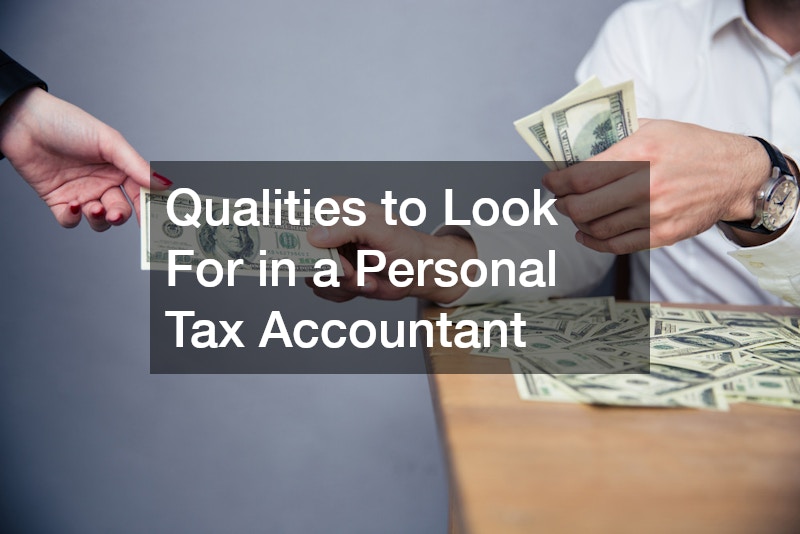
When it comes to managing your finances, having a reliable personal tax accountant is invaluable. Tax laws and regulations can be complex, and making mistakes can lead to penalties or missed opportunities for deductions. The right accountant ensures your tax obligations are met while maximizing your financial benefits.
To find the best fit, there are several key qualities you should look for in a personal tax accountant.
Expertise in Tax Laws and Regulations
The primary quality to look for in a personal tax accountant is a deep understanding of tax laws and regulations. Tax codes are intricate and often subject to changes, so your accountant must stay updated on the latest developments. Their expertise ensures accurate filing, compliance with legal requirements, and the ability to take advantage of applicable tax deductions and credits.
An accountant with specialized knowledge of personal tax law can also provide tailored advice, helping you make informed decisions about investments, deductions, and long-term financial planning. This expertise becomes especially important if your financial situation involves unique complexities, such as owning rental properties, managing multiple income streams, or dealing with international tax matters.
Strong Analytical and Problem-Solving Skills
Taxes often involve sifting through financial data to identify the best course of action. A great personal tax accountant should possess excellent analytical skills to assess your financial situation and identify opportunities for tax savings. They should also be adept at problem-solving, whether it involves resolving discrepancies in financial records or addressing issues with tax authorities.
This ability to analyze and think critically ensures your accountant can handle unexpected challenges effectively. For example, if an error is identified in a previous tax return, they should be able to resolve it quickly while minimizing any potential financial or legal consequences.
Attention to Detail
Tax preparation requires precision, as even small errors can lead to significant issues, such as audits, penalties, or delays in refunds. A skilled personal tax accountant pays close attention to detail, ensuring all forms are accurately completed and all necessary documents are included.
This meticulous approach extends to their communication as well. A good accountant reviews your financial information thoroughly, asks clarifying questions, and ensures no aspect of your tax situation is overlooked. Their diligence provides peace of mind that your taxes are being handled with care and accuracy.
Excellent Communication Skills
A personal tax accountant must be able to explain complex tax concepts and strategies in a way that is easy to understand. They should communicate openly and clearly about your tax obligations, filing deadlines, and any necessary actions on your part.
Additionally, strong communication skills are crucial for building trust. Your accountant should be approachable and willing to answer questions, ensuring you feel confident in their ability to manage your finances. Look for someone who maintains regular contact and provides updates throughout the tax preparation process.
Professional Credentials and Experience
Professional qualifications are another essential factor to consider when selecting a personal tax accountant. Credentials such as Certified Public Accountant (CPA), Chartered Accountant (CA), or Enrolled Agent (EA) demonstrate their expertise and adherence to industry standards.
Experience is equally important. An accountant with years of practice handling personal taxes is likely to have encountered a wide range of scenarios, giving them the insight to handle your unique needs effectively. If possible, choose someone with experience in areas relevant to your situation, such as self-employment taxes, estate planning, or retirement income.
Strong Ethics and Integrity
When dealing with financial matters, trust is paramount. A personal tax accountant should demonstrate strong ethical principles and maintain the highest standards of integrity. They must prioritize your best interests, providing honest advice and ensuring compliance with all legal requirements.
Avoid accountants who promise unrealistic results or suggest questionable practices to reduce your tax liability. A trustworthy accountant will always prioritize ethical conduct over shortcuts that could put you at risk.
Availability and Responsiveness
Taxes are often time-sensitive, requiring prompt attention to meet filing deadlines and avoid penalties. A reliable personal tax accountant should be available and responsive, especially during the busy tax season. They should also be accessible throughout the year for questions, updates, or assistance with financial planning.
Responsiveness is especially critical if you face an urgent situation, such as an audit or a notice from tax authorities. A dependable accountant will prioritize your needs and provide timely support to resolve any issues quickly.
Proactive Approach to Financial Planning
A great personal tax accountant goes beyond simply preparing your tax returns. They take a proactive approach, offering insights and strategies to improve your financial situation. This includes helping you plan for future tax years, advising on investments, and identifying opportunities to save money.
For example, they might recommend contributing to a retirement account to reduce taxable income or suggest ways to structure your finances for better tax efficiency. Their forward-thinking approach ensures you’re prepared for potential changes in your financial or tax situation.
Strong Reputation and Positive Reviews
Before hiring a personal tax accountant, take the time to research their reputation. Look for reviews or testimonials from past clients to gauge their level of expertise, reliability, and customer service. Personal recommendations from friends or family can also be a valuable resource when evaluating potential accountants.
A strong reputation indicates that the accountant consistently delivers quality service and builds lasting relationships with their clients. It’s a sign of their commitment to helping individuals and families achieve their financial goals.
Choosing the right personal tax accountant is a critical decision that can have a significant impact on your financial health. Look for someone with expertise in tax laws, strong analytical skills, attention to detail, and excellent communication. Prioritize professional credentials, ethics, and a proactive approach to financial planning. By finding an accountant who embodies these qualities, you’ll gain a trusted partner to navigate the complexities of taxation and ensure your finances are in good hands.
.



